Whether through research, analysis, debate or thought leadership, Think tanks play a key role when it comes to UK regional and national policy.
But with Industrial Strategy back in focus and policy shifting fast, how can UK Think tanks continue to drive impact whilst managing challenging budgets and outdated datasets?
In this blog we take a look at how innovative Think tanks are working with The Data City to give them a clearer view of the UK economy and emerging sectors, helping them to publish work that’s accurate, actionable and influential.
What are Think tanks?
Think tanks are research-led organisations producing policy analysis, sector mapping and insights for government, media and the public. Unlike consultancies, they’re typically non-profits or charities, working to inform rather than sell.
In the UK, organisations like the Institute for Government, Centre for Cities, the Centre for Policy Studies and the Tony Blair Institute help shape national debate through rigorous, accessible research.

But their role is changing. Many are evolving into “think-do tanks” – combining deep analysis with real-world experimentation, faster publishing, and practical engagement with policy.
At the same time, they face tighter budgets, a faster policy and media cycle, growing demand for digital storytelling, and pressure to demonstrate measurable impact.
To meet these challenges, leading Think tanks are investing in better tools and platforms.
Think tanks role in UK policy
As trusted sources of evidence and ideas, think tanks influence decision-making in Westminster, devolved governments, combined authorities and beyond.
When their research is clear, timely and grounded in strong data, it often shapes the national conversation — and the strategies that follow.
That makes credible, up-to-date and policy-relevant data a non-negotiable for think tanks trying to lead on:
- UK Industrial Strategy
- Growth-driving sectors (IS-8)
- Regional productivity and place
- Skills and innovation
- Net Zero and economic resilience
But traditional data sources (like SIC codes) aren’t built for today’s economy. They miss emerging sectors, undercount innovative businesses, and slow down the research process.
Where The Data City comes in
High-impact research depends on high-quality data. To tell clear, credible stories about the UK economy, Think tanks need insight that reflects today’s industrial landscape, not outdated classifications. That’s where The Data City helps.
We work with organisations across central and local government, as well as leading Think tanks like the Centre for Cities, CLES, the Northern Powerhouse Partnership and the Bennett Institute.
In Centre for Cities’ Cities Outlook 2025, our data helped define the cutting edge of the economy, showing how new economy firms are driving growth across the country.
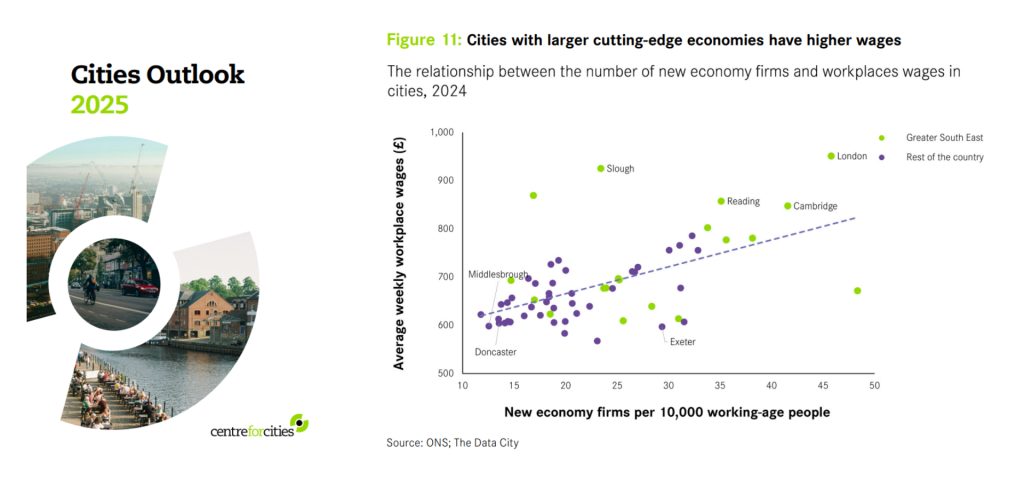
CLES used the platform to map social economy suppliers in health and life sciences across eight London boroughs, helping councils strengthen local procurement.
And the Northern Powerhouse Partnership used our insights to map the net zero economy and pinpoint growth opportunities in the North.
All of this is powered by our Industry Engine platform, a tool that combines live company data with modern classifications to map key areas like Net Zero, Life Sciences, AI, and Advanced Manufacturing.
At its core are Real-Time Industrial Classifications (RTICs) – 500+ sector definitions built with AI and expert input that help researchers and policy teams explore frontier industries with confidence.
From national strategy to local place-based work, The Data City gives Think tanks the clarity and evidence they need to shape influential research.
How Think tanks use The Data City platform
Here’s just a few ways UK Think tanks can use The Data City’s tools and data to explore what’s really happening in the economy.
Understand emerging sectors
To shape forward-looking policy, it’s important to understand where innovation is actually happening.
Our Real-Time Industrial Classifications (RTICs) help researchers go beyond legacy SIC codes and define sectors in a way that reflects today’s economy.
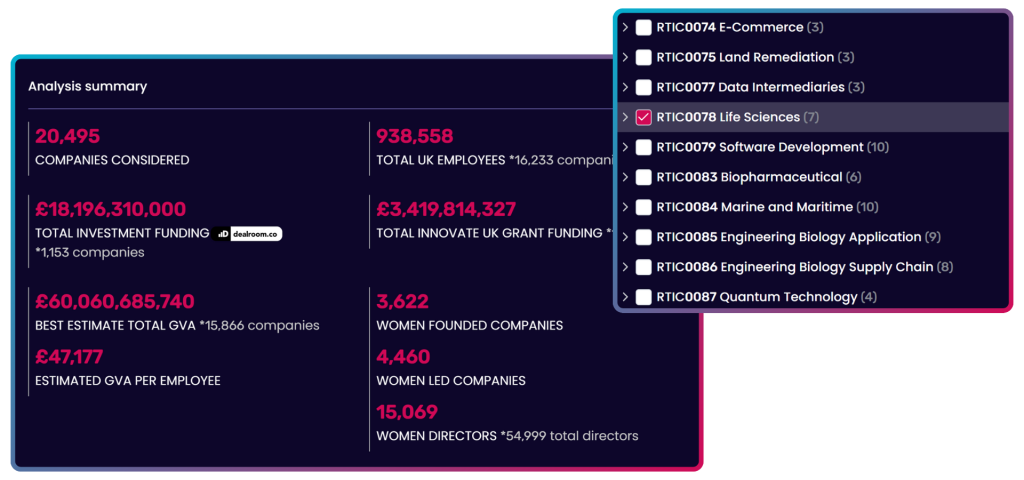
The platform includes over 500 verticals across more than 60 sectors. You can explore sector size, employment, investment and geography, or drill down to individual companies for case studies, startup tracking or regional comparisons.
This supports work on industrial strategy, sector-focused research or thematic studies in areas like AI, Life Sciences or Clean Energy.
Run regional analysis
Accurate local and regional insight is essential for work on levelling up, devolution and place-based policy.
In the platform, users can filter by local authority, city, region or postcode to explore which industries are active where, and what role they play in the local economy.
For example, in Cambridge, Life Sciences stands out as a leading emerging sector. Our interactive map reveals not just the volume of firms, but where clusters are forming – with the ability to drill into standout companies for deeper insight.
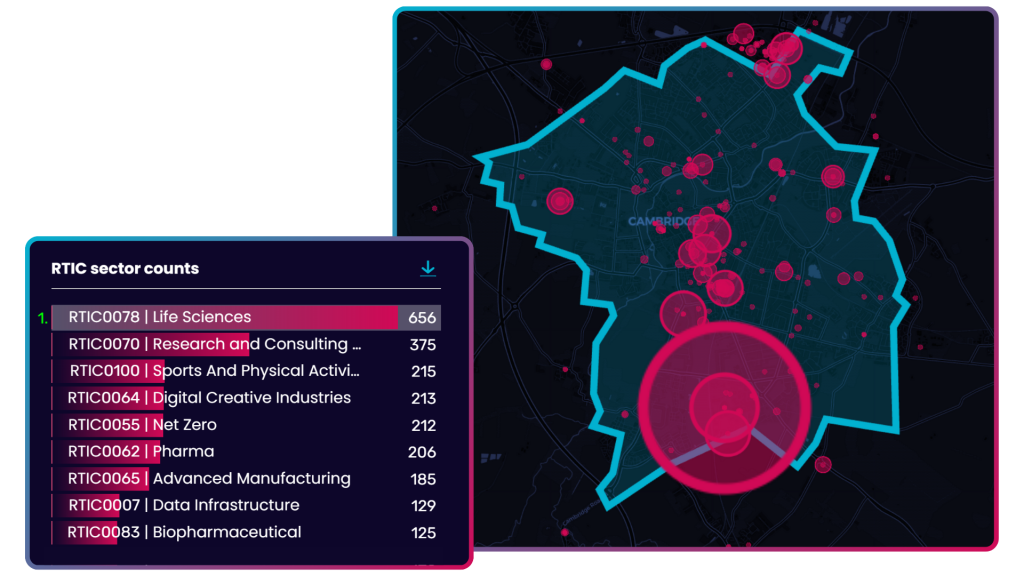
This helps build a clearer picture of regional strengths, gaps or opportunities and can support evidence for local economic strategies, briefings or funding bids.
Track jobs and skills
Understanding the labour market is essential for credible, forward-looking policy research.
With our Lightcast upgrade, The Data City gives you real-time insight into employment rates, salary trends, in-demand skills and job postings – all mapped to emerging sectors like Net Zero, MedTech and AI through our RTICs.
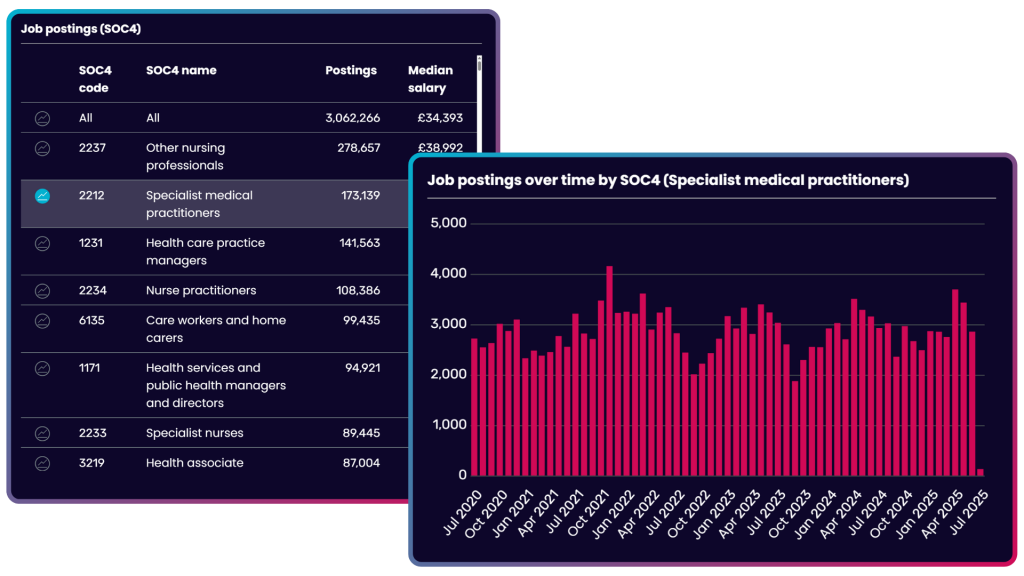
For example, within the Life Sciences RTIC, you can track hiring trends for specialist roles like medical practitioners and care managers, with the ability to view demand over time.
It’s a powerful upgrade that lets you analyse the workforce behind high-growth industries and support your work with sharper evidence.
Develop UK Industrial Strategy
Whilst the IS-8 have been outlined in the UK’s Industrial Strategy, Government has agreed SIC codes are not effective in mapping frontier economy sectors.
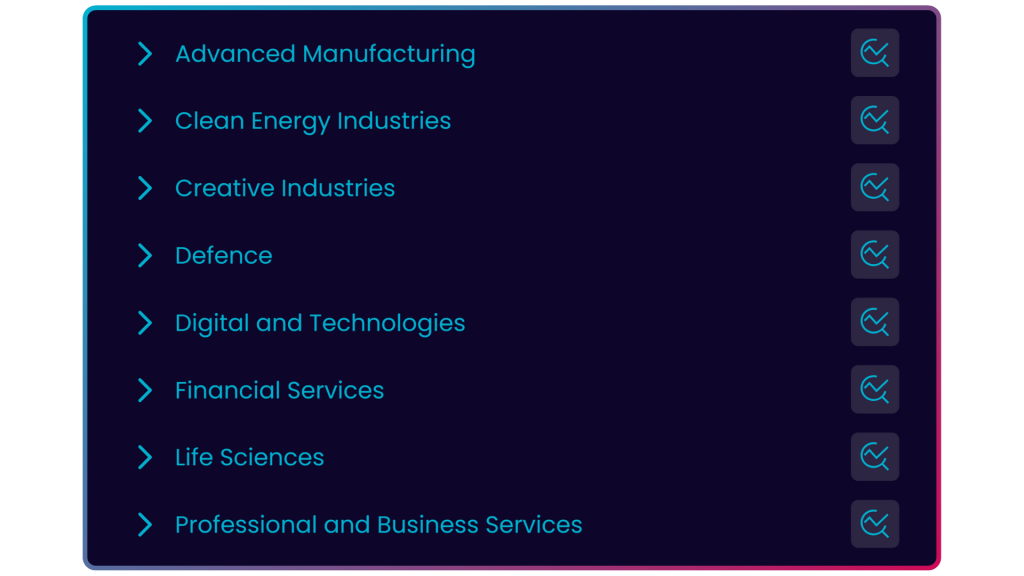
That’s why we’ve added the UK Industrial Strategy’s eight priority sectors (IS-8) as filters across our platform – making it easier than ever to analyse key industries like Clean Energy, Life Sciences, and Advanced Manufacturing.
Support influential research
We’ve designed The Data City to make good data easy to use.
You can work directly in the platform or export data freely for your own tools, reports and analysis. There are no download limits, and our API lets larger teams connect insights into existing systems.
This gives researchers the flexibility to move quickly, back up their recommendations with real-time evidence and publish work that gets noticed by policymakers and the public.
Try The Data City
Working at a think tank or policy institution, or are just interested in seeing our platform in action? Remember we offer a 7-day free trial.
Working on a specific project or representing an industry? Please get in touch.

